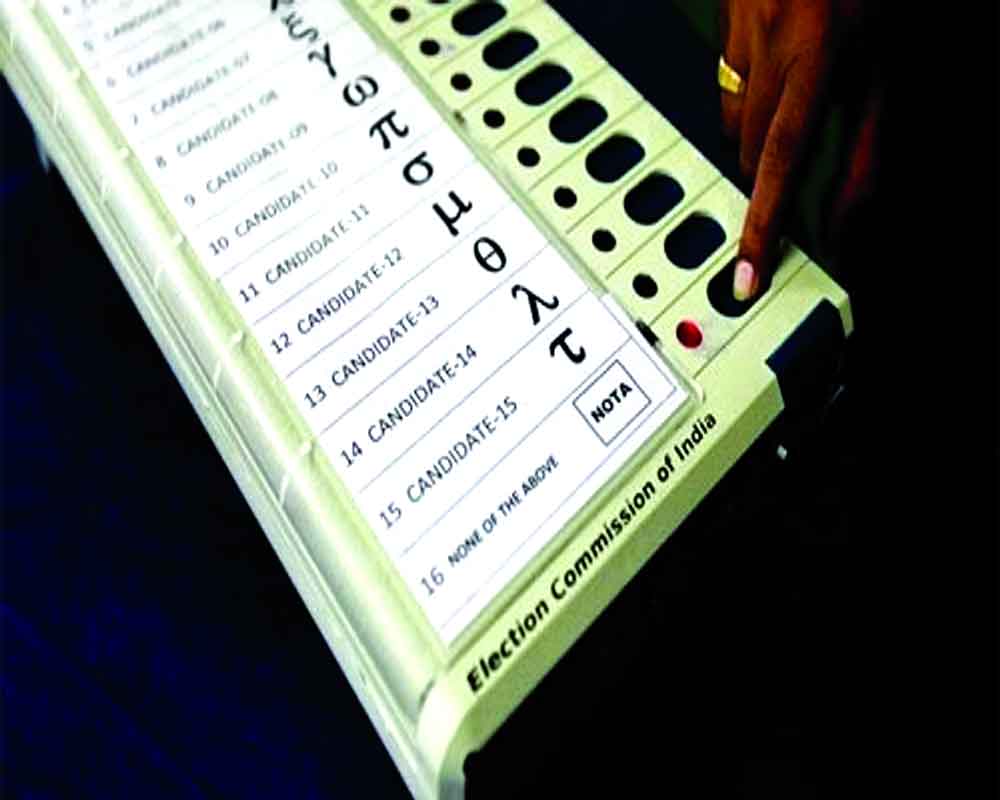NOTA continues to be a tool of dissent in the electoral democracy. It empowers the electors to register their discontent with the pool of candidates while maintaining secrecy, thus persuading parties to field better candidates
It's impeccable to christen NOTA in the truest sense of the word as the 'Sankat Mochan' of democracy in political Lanka, as each vote deserves a political Ayodhya, not a chaotic Lanka. With the 2013 judgment of the Hon'ble Supreme Court of India (PUCL v. Union of India), a firm position was set that in an exceedingly legal system, electors must be given the right to reject, which owes its genesis to freedom of speech and expression (Art. 19(1)(a)). However, this was substantially necessitated on account that secrecy of casting a vote was duly recognised under the provisions of the Representation of People's Act, 1951, and the Conduct of Election Rules, 1961, as being fundamental to free and fair elections.
The 170th Report of the Law Commission, 1999, while laying down the chassis of NOTA, recommended a method to ensure the purity of elections, keep out criminals and other undesirable elements, and minimise the role and importance of caste and religion. Pursuant to this, no candidate could be declared returned unless he obtains at least 50% of the votes cast, and to determine such a percentage, even the negative vote would be treated as votes cast. The report also recommends a 'run-off' and fresh election if candidates fail to secure the requisite percentage. This was endorsed by the Background Paper on Electoral Reforms, 2010. Even in Columbia, blank votes are considered to be valid ones and there stands similar provision to this effect.
However, in its press release dated October 28th, 2013, the Election Commission of India clarified while referring to provisions of the Conduct of Elections Rules, 1961 (clause (a) of Rule 64) read with the Representation of the People's Act, 1951 (Section 65), that even if the number of electors opting for NOTA option is more than the number of votes polled by any of the candidates, the candidate who secures the largest number of votes has to be declared elected. This implies that even if 99% of the electors rejected the candidature of all the candidates, conversely, in defiance of their mandate, the candidate who managed to secure just 1% of the votes could be declared to be returned. This serves as a testimony of NOTA having no electoral value in India, ergo, there's no wrong in deeming it nothing more than a protest vote. Be that as it may, to justify the forthcoming quote "Not all battles are fought for victory. Some are fought simply to tell the world that someone was there on the battlefield" (Ravish Kumar) in an electoral democracy could set the stage for catalysing NOTA as just a token of gesture which is bound to be unjust.
Nevertheless, NOTA continues to be a tool of dissent in the electoral democracy. It empowers the electors to register their discontent with the pool of candidates while maintaining secrecy, thus persuading parties to field better candidates. In the 2018 Assembly election of Madhya Pradesh, NOTA bagged fifth largest tally of votes polled (1.42%) which was more than SP (1.3%) and AAP (0.66%). Similarly, in Karnataka, NOTA secured more votes than BSP and CPI (M) which are national parties. The figures are indicative of the significant usage of NOTA in numeric sense, however, its impact still remains insignificant.
The State Election Commission of Haryana deviated from the practice of Election Commission of India during the Municipal Elections. A notification dated November 22nd, 2018 by the SEC, Haryana deemed NOTA to be a 'Fictional Electoral Candidate'. It further went on to state that if a situation arises where NOTA receives the highest number of votes, then a fresh election would be conducted. All candidates who received lesser vote than NOTA would become ineligible from contesting the re-election. Similar notification was also published by the SEC, Maharashtra in the same year. In yet another development from the past, the Supreme Court issued a notice to the Centre and the ECI on March 15th, 2021 on a PIL which sought a direction to the poll panel to nullify an election result and conduct a fresh poll if the maximum votes in a particular constituency were for NOTA.
For a democracy to survive in its true form it is essential that the best available men should be chosen as people's representative and if electors find none from the roaster to be suitable enough, negative voting is necessitated. However, the rationale behind the 2013 judgement of the Apex Court has failed to bear fruits. In a vibrant democracy, voter's choice must be of paramount and if they palpably reject all the contesting candidates, their choice should be empowered by way of a fresh election.
In the existing scenario, if we picture the electoral stage as a grand theatre; NOTA plays the role of a silent spectator, leaving no tangible mark on the political drama. Thus, even with the popularity of NOTA among the electors experiencing a significant rise over the years, the question of whether it is 'revolutionary' or mere 'illusionary' lingers.


























